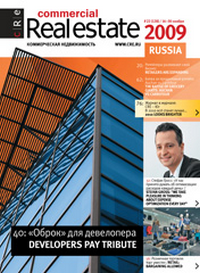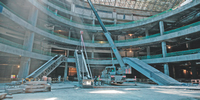Destitute City

According to the Moscow Department of Finance, the first 9 months of 2009 have seen lower investment contract revenues coming into the city`s coffers from developers, to the tune of 7.964 billion rubles – 73.7% less than in the same period last year. If the capital continues to build relationships with developers on the classical “pay for play” principle, there is a risk it will be left without both “pay” and “play”. Is Moscow ready to make concessions for the developer? Officials assert that this is already being done.

"Tithes" for the developer
Not so long ago, Moscow lost its share from development projects. Prior to that, developers were forced to pay a "tithe" to the capital from 25 to 50% of the built area, despite the fact that federal law made no such provisions.
“The city share – is a Moscow phenomenon, and was something enacted by Moscow Government," says Sergey Gogolev, general director of TriGranit Development Russia. "Contradictions between city and federal laws in this matter is a subject disputed by legislators and lawyers, and for the common investor the dilemma has always been: subscribe to the local rules or try luck in other regions. However, given the current market conditions, the latter is perhaps too risky.”
Developers received absolutely nothing for paying the ity`s share. In fact, they were paying only for the opportunity to build a facility in Moscow. “The concept of the so-called `city share` is attributed to the mayor and his team," says Ivan Potekhin, CEO of Espro. "This happened in the mid-nineties, when it became clear that the construction business was booming and becoming extremely profitable, but the city was receiving only taxes... At first, the city`s share rarely exceeded 10–15% of the total area. But later the situation has changed.” The legislative basis for the `city share` were the Moscow city regulations and standards – orders of the mayor, the Moscow law dated July 9, 2003 No. 50 “On the procedure for preparing and obtaining construction and reconstruction permits”, the Resolution of Moscow City Government dated August 19, 2003 No. 698-PP “On approving the methods of determining the volume of reimbursement to the city from investors for social and engineering infrastructure.”
Until 2005–2006, the share of the city was collected in kind. The volumes were determined only for residential construction. In the central district, the basic share was 50%. In all the other districts this was 30%. “Depending on what the developer`s outlay would be for laying communications and other utility services, the share of the city could be reduced. For developers, this mechanism was completely opaque," says Yuri Borisenko, head of real estate, land, and construction at Vegas-Lex law firm.” – The way in which the city`s share could be reduced, was not indicated anywhere. In the commercial real estate sector, proportions were set arbitrarily, and payment was expressed in monetary terms...The money received as the city`s share, were mixed into the general budget.”
However, in 2006 the State Duma adopted the law “On amendments to the Land and Urban Development Codes of the Russian Federation”, under which the collection of fees for connection to the infrastructure from investors was deemed illegal. In retaliation Moscow adopted on November 7, 2006, resolution # 882-PP “On approval of the methods for determining the estimated size of the payment to the city of Moscow by investors in implementing investment projects of construction and reconstruction.” According to the resolution, the payment could be made in monetary terms; the amount of fees was determined by a special formula. “Taking into account the fact that the amount obtained on the basis of the formula was too high (20–50% of the total budget), and given that this additional burden in an emerging market would make it almost impossible to implement any development project – such matters were dealt with individually,” – says Roman Kuschuk, project manager for GVA Sawyer. Everything depended on the volume of construction, housing density, the balance of above-ground and underground areas, the functional purpose of the future construction and where it was located.
When people started asking the Government of Moscow, starting even at the federal level, as to why the Land Code was not working, the capital city government in 2007 responded by introducing a simple "fee to the city" – without any justification. “The resolution, in fact, served only to camouflage the reality that nothing had changed, and the fee was similar to the tithe," says Yuri Borisenko. "We researched this question and have found that that social and engineering infrastructure for the most part did not belong to the city. Fees for connections to the networks needed to be additionally paid. As far as the roads are concerned, they are for public usage, and therefore the developers should not have to pay for them.”
Let`s negotiate
"The city`s share, due to uncertainty and fuzziness of the concept is the subject of speculation and bargaining between the government and each developer," considers Ivan Potekhin. "Nowhere is it clearly indicated what the city`s share should be. The share of the city is simply calculated by the Administration for each object individually.”
For the investor the need to provide a portion of the facility to the city often created other problems as well. “If the investor`s goal is to create an object of institutional quality, the presence of another’s premises in the building creates a `dent` and makes it hard to sell the property down the road," considers Sergey Gogolev. "Although in this case the past history of an object and the price of land play a significant role. Thus, if the city possesses 30% of the Central Department Store, this is not a hallmark of `poor quality`. At the high cost and technical complexities of the reconstruction this can make the object extremely capital intensive, even before the city share fee is added on top.”
Payments to the city sometimes reached astronomical figures. “The largest figures that I have ever seen were $180 million – this much the developer had to pay for the IFC in the Shabolovskaya District (developer – Mos City Group) and $150 million for the reconstruction of “Gostiny Dvor,” says Yuri Borisenko. "If the city share were to be recognized as illegal – just since 2006, the Moscow government would have to pay back more than one and a half billion dollars from its budget to developers.”
How to get money back?
Today one needs only to pay for the right to rent a parcel of land. This fee is usually defined by an independent appraisal and it is done on an individual basis. As Marina Ogloblina, the head of Moscow`s economic policy department says, on January 27, 2009, the Government of Moscow passed Resolution No. 46-PP that established lower ratios for cadastral values. FRS determines the cadastral value of a parcel after the architectural documentation is submitted to the Moscow Architecture Committee.
“The resolution talks about more favorable payment terms of the `city share` – the wording `payment of a fee for the right to sign a leasing contract for land designated for construction or reconstruction` has been replaced with `leasing payments that are obligatory during the first year after changing the designated purpose of a project`,” says Roman Kushchuk. "In more detailed calculations, described in the resolution, the amount of the `city share` can be reduced several times in comparison with earlier calculations”.
Sergey Gogolev notes that the resolution has only been passed in January 2009, and the average term of a development project cycle is not less than 3 years, therefore it is still too early to speak about a positive or negative impact of this resolution.
Resolution No. 46-PP will allow savings for those buying land today. “The price of the right to lease is close to the market value of land rentals," says Yuri Borisenko. "This figure can be increased, but of course not to where it will be half of the future property price... As far as I know, the question of additional payments to the city no longer exists. Now another question surfaces – how can a developer get back the money he paid as the `city share`, for those projects that have not been brought to fruition?” It is necessary to prove in each case that the Moscow Government is guilty for the project failure. According to Yuri Borisenko, this is quite possible, because auctions were held on terms of Permitted Use Acts, executed by Moscow. The fact is that the Moscow government, to put it mildly, `misled a lot of builders` at the time of auctions, though collecting all this evidence requires a lot of scrupulous effort.
“There are several ways to approach this problem," says Borisenko. "Inteco, for example, is re-negotiating with the city, insisting on reimbursemnt of the money it paid to the city. Rumors on the market are circulating, saying that a 30–50% `discount` is withheld if the fee is refunded. In addition, it is possible to consider going through courts. There have been no rulings on this subject yet, but I feel confident, that they will appear very soon.”
A few positive steps
One example of Moscow`s desire to meet a developer halfway regarding “an already established obligatory payment” can be seen in its current negotiations with AFI Development. This concerns the 25% share in the Mall of Russia project, which was to go to the city if the company were to finance the construction of City`s adjacent objects. Another example is the fact that MR Group has received a one-year `payment vacation` for the right to lease the land for Victory Plaza BC. “The decision to grant the MR Group a year`s `rent vacation` seems quite logical. The city has the right to grant such concessions for rental payments. If an investor lacks the money to make a leasing payment today, and a payment delay will help the investor stay in the project, then such a concession is legal,” says Yuri Borisenko.
Besides the willingness to forego the `city share`, Moscow is ready to take a number of other measures. “The city has decided to provide `payment holidays` for projects of those investors that have money to finish them, but are not able to do so on time,” says Marina Ogloblina. The time it takes to receive approvals is also important for a developer during a crisis. “Our department actually halved the list of payable documents given out by city executive authorities to developers," continues Ogloblina. "We wanted these measures to reduce business expenses by more than 3 billion rubles.” There is also a proposal to set a general deadline for approval of investment contracts to 30 working days; and the term for coordination of investment contract projects and additional agreements to them, preliminary areas distribution reports – to 10 days, which is a remarkable turn given that it earlier took from 8 to 18 months to raise all consents. The developers also noted some other important steps taken by the city that could help them today. “The most pressing issue for projects which are on a realization stage, is the possibility of delaying the performance of city requirements, that equally concerns obligations in kind and monetary payments," says Sergey Gogolev.
Автор: Tatiana Demidova
Commercial Real Estate №22 (128), November,16-30 2009

